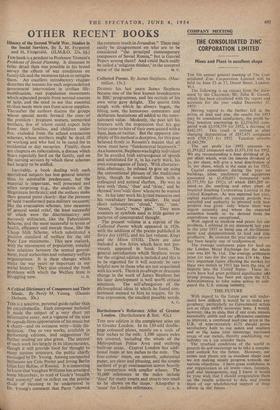OTHER RECENT BOOKS
History of the Second World War. Studies in the Social Services. By S. M. Ferguson and H. Fitzgerald. (H.M.S.O. 22s. 6d.) Tins book is a pendant to Professor Titmuss's Problems of Social Planning. It discusses in fuller detail than was possible in his broad survey the effects of war conditions on familylife and the measures taken to mitigate them. An excellent introductory chapter describes the reasons for such unprecedented government intervention in civilian life: mobilisation, vast population movements which separated people from normal sources of help, and the need to see that essential civilian needs were met from scarce supplies. Thereafter the authors discuss the groups whose special needs formed the core of the problem : pregnant women, unmarried mothers, few of whom could expect help from their families, and children under five, excluded from the school evacuation schemes, whose mothers might be dead, ill or working and who had to be cared-for in residential or day nurseries. Finally, there are chapters on tuberculosis, a disease which bears especially hard on the family, and on the nursing services by which these schemes had largely to be staffed.
Inevitably, a book dealing with such specialised subjects has less general interest than its admirable predecessor, but the material is important, well presented and often surprising (e.g., the analysis of the illegitimate birthrate); and the authors make their general point clearly: that the pressure of need transformcd para-military measures, like the evacuation schemes, into measures bf general social relief, the least successful Of which were the discriminatory and narrowly utilitarian, like the Tuberculosis Scheme, and the most successful in terms of health, efficiency and morale those, like the Cheap Milk Scheme, which substituted a Positive standard of welfare for the old Poor Law minimums. This new outlook, With the movements of population, entailed new relations between the central govern- trtent, local authorities nnd voluntary welfare organisations. It is these changes which make the war years so important in our social history. They also created the fresh problems with which the Welfare State is


































 Previous page
Previous page